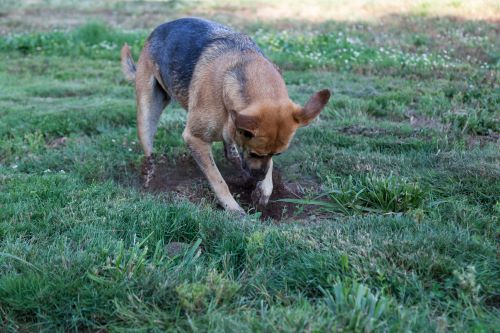Dealing With Digging and Scratching

Finding holes can be frustrating, but digging is a natural part of the way dogs explore and become more familiar with their surroundings. Many dog lineages are actually predisposed to the act of digging.
Likewise, scratching can be a natural way to interact with the environment, especially once a dog learns that it is able to bring them a desired effect like being let out of their crate early.
Because this type of behavior usually sprouts in puppyhood, older dogs who have not had their instincts to dig and scratch curbed tend to cling to them as a way to relieve stress or cure boredom.
Dealing with digging and scratching means tackling the reason why your dog finds it necessary — or, at the very least, entertaining.
Digging and scratching is a resolvable issue, but it may take more than one approach to manage effectively. The first step is to better understand your dog’s personality.
Do they require a lot of attention? Are they obsessed with hunting prey?
The unique factors of your dog’s personality can also aid in relieving this inconvenient habit.
The professional dog trainers at Greenlin Pet Resorts are trained to help determine the drivers of undesired behaviors and help dogs reshape their habits.
We also offer personalized guidance to owners, along with demonstrations on how to make the most of your canine’s new classroom-developed skills. To learn more about the dog training lessons at Greenlin Pet Resorts, or to find a location near you, contact us online.
Greenlin has 6 locations in the Harrisburg area, with skilled team members standing by during business hours.
Why Is My Dog Digging Holes?
Dogs dig holes for many reasons. In some cases, they are acting out routines they personally feel are important, especially when they feel bored or have pent-up energy. It is also likely that they are trying to tell you something through this action.
Finding the reason is the first step to curbing their desire to continue carrying out this habit. Once you have concluded why your dog likes to dig, you can use an appropriate deterrent or distraction.
The following is a list of common reasons for scratching and digging holes:
- Boredom: Just like humans, when a dog is bored, they look around for something entertaining that can relieve their mind.
This is one of the most common reasons for digging, and it is most normally seen in dogs who are left alone for long periods of the day, inside or outside.
If your dog doesn’t have access to the outside while you are gone, chances are you’ve noticed an attempt to dig and scratch at other things.
- Storing food: This is a reason commonly observed in puppies who are still learning about the ins and outs of their new environment. Dogs detecting scents through things like cabinets and closed doors will dig and scratch to gain access.
They may also try to make holes and hide their favorite tasty snacks to come back to later.
- Regulating body heat: When the weather simply isn’t right, you might notice your dog flocking to their favorite spot in the backyard to dig and then lay down.
This behavior is seen when dogs are too hot and too cold. They likely find cooling relief in the dirt but can also warm up from the exercise.
- Stress of anxiety: If your dog struggles with stress or anxiety symptoms, they may use digging as a way to cope with their big emotions. Digging can be a way to release some of their built-up tension and escape from whatever is bothering them.
- Natural hunting instincts: Many dog breeds have natural hunting instincts that could present themselves through the act of digging or scratching. If your dog sees a little mouse or rabbit trying to escape underground, it is in canine nature to chase it.
How to Stop My Dog From Digging?
Now that we have determined why your dog is digging, we can find an effective approach for combating the behavior. To get a dog to stop digging, the main idea is to distract them or give them something else that could soothe the need to dig.
Common ways to stop your dog from digging include:
- Redirect attention: If your dog is bored, the best way to combat digging is to adjust their attention to something else.
Try spending more time on walks or investing in engaging toys. If you feel like you don’t have enough time to keep your dog occupied, there are enrichment toys that your dog can play with independently.
You can also enroll your pup in a doggy daycare program while you are busy throughout the day.
- Find the cause of anxiety: If your dog is digging because they are anxious, one of the only ways to stop this habit is to help them through whatever is stressing them out.
Owners of dogs with anxiety are advised to reach out to their vet for personalized tips and tricks on dealing with their dog’s unique needs. Many pet parents find relief in calming treats and comforting toys.
- Keep your dog’s space neat: A dog that is digging to store food or their favorite toys is likely doing so because they do not believe that their prized possessions are safe when left in the open.
To combat this, try keeping their space neat and tidy, giving everything a proper place. Also, homes with multiple dogs can strive to provide separate areas so that pups can get some “alone time” and a sense that no one else is going to take their possessions.
- Look for signs of being too hot or too cold: Dogs that dig to regulate their temperature may just need a little more help from mom or dad. In the cold months, wrap your pup up in their favorite blanket and crack the heater up an extra degree or two.
When it gets hot, cold water, pupcicles, and a good fan can make all the difference in preventing digging. Also, watch the weather frequently to avoid leaving an animal outside during hot or cold spells.
- More exercise: When a dog digs to let out some primal hunting instincts, it may be beneficial to give them more opportunities for exercise in their daily life.
This habit likely means that they need to be blowing off more steam during their daily walks or playtime with you.
What About Preventing Scratching?
Scratching behaviors mirror many of the same causes and effects as digging, but with one important caveat: scratching is often positively reinforced through unintended reactions to the scratching.
For example, a dog may scratch at a door when wanting to go outside or come inside. They may also scratch at their kennel or a closed door when feeling anxious or impatient.
If an owner responds to these behaviors by giving the dog what they want, the dog learns scratching can be a positive experience.
Limit this reinforcement by either ignoring the behavior until it ceases, then responding, or by redirecting the dog’s attention to another strategy. For example, many dog owners hang bells by the back door as a way for the dog to signal: “Hey, it’s potty time!”
Dog owners can also help reduce anxiety-driven scratching by giving the dog more exercise and more attention throughout the day.
In cases where dogs respond to crating or being sequestered in a room by scratching, the owner can revisit crate training strategies while taking steps to reduce the time the dog spends isolated.
Long-Term Strategies to Prevent Digging and Scratching in the Future
Preventing digging and scratching isn’t just about finding the right distraction. As with any type of dog training, consistency is key.
To prevent digging in the future, you must train the behavior out of your dog while seeking to meet the needs they are expressing through the behavior in less destructive ways.
Unfortunately, while there are many common strategies to try, each dog will need a customized approach to reduce these behaviors.
You can use positive reinforcement, environment adjustments, and more attention to help your dog understand that there are other ways to blow off some steam. The main idea is to try and adjust your dog’s relationship with their habit so they don’t feel a need to do it anymore.
Professional trainers can help you get to the root of your dog’s behavior and then develop commands, habits, and routines that reduce the risks of digging or scratching occurring.
What Does It Mean if These Behaviors Develop Out of Nowhere?
If your dog wasn’t prone to digging or scratching before but has taken up the inconvenient habit, it would be productive to look at any recent changes in your lifestyle. Are you home more? Less? The way your lifestyle looks directly impacts your dog.
If your dog is used to you working from home all day and then you find a new job, things may feel hectic at home for them. They may also have newly developed anxiety or senses of boredom. These can be exacerbated by underlying medical issues, as well.
If your dog develops a habit of digging or scratching out of nowhere, it likely means that they are communicating their feelings about some recent change in their life.
Work with your veterinarian and an experienced dog trainer to help understand what changes could have occurred and how to best respond to them.
Reversing Undesired Behaviors With Dog Training at Greenlin Pet Resorts
It can be frustrating and overwhelming to manage to reverse your dog’s digging or scratching behavior on your own.
When you come to Greenlin Pet Resorts for training lessons, one of our experienced dog trainers will help you complete an initial consultation where you share your goals with us. Our trainers can then work with your pup to bring them closer to your goals.
To find a training location near you, contact us online, or call us at (717) 388-8110. Greenlin has 6 locations in the Harrisburg area and representatives standing by during business hours waiting to get in touch with you.
